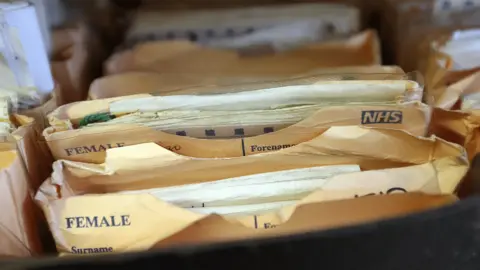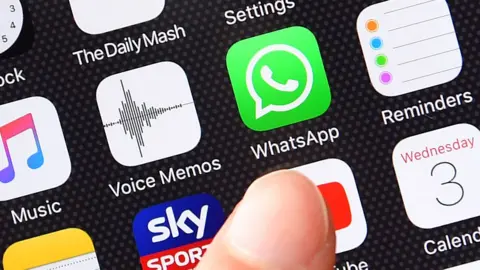Use of WhatsApp in NHS 'widespread', say doctors
 Getty Images
Getty ImagesDoctors and nurses are using WhatsApp and Snapchat to share information about patients "across the NHS", health professionals have told the BBC.
GP Alisdair MacNair said he was aware of a number of medical groups using WhatsApp to discuss patients.
Use of internet-based messaging apps to send patient information is banned under current NHS guidelines.
NHS England told the BBC that it had no comment on the matter.
Dr MacNair said: "I have also seen chat on Facebook groups that sails pretty close to the wind in terms of discussing medical information.
"I've definitely seen stuff which is one step away from being patient identifying.
"I'm very wary of going near anything like that because of the risk of breaching data laws, but it would appear others don't seem to be aware of the risks."
The healthcare body needed to act swiftly to address the issue, or potentially face huge fines for data breaches, said Forrester analyst Kate McCarthy.
She likened current practices to the "wild west", adding that the NHS was "incredibly far behind" in the adoption of digital sharing systems.
"I am empathetic with doctors because there is a need and desire among healthcare professionals to share this information and the fact that nothing exists for them to to do so is a huge problem," she said.
"But that doesn't make it OK to share patient data on Snapchat.
"The reality is that doctors are responding to the inadequacy of what the NHS is providing.
"They are creatively trying to find better ways to provide care, but they are using non-compliant tools."
Quick and easy
The way that the UK's health service looks after data is in the spotlight following an Information Commissioner's Office (ICO) investigation into how 1.6 million patient records were shared with Google's DeepMind.
The artificial intelligence company said it wanted to develop an app to alert doctors and nurses about patients at risk of kidney injury.
The ICO found that the NHS had been in breach of data laws in the way it had allowed DeepMind to access the records.
A subsequent report from an independent panel set up by DeepMind to assess its work suggested that the NHS's use of technology was in a dire state.
It said it was the UK's largest purchaser of fax machines, adding that was a "dubious" position to hold.
 Getty Images
Getty ImagesGeorgie Gould, a junior doctor who last year conducted her own study of how doctors were communicating, found 30% of surgeons at St Peter's Hospital in Chertsey, Surrey, were using WhatsApp as part of their day-to-day communication.
It bears out similar findings published in the British Medical Journal, which found that of 2,000 doctors across five hospitals, a third were using web-based apps to send clinical information.
An NHS consultant trauma surgeon, who did not wish to be named, told the BBC: "We use WhatsApp because it's the quickest and easiest way to communicate with a whole team or group of clinicians.
"So, if you're responding to a major incident, you can have the whole team involved and see what's coming [in terms of patient injuries] so teams can be ready."
"It can also be really helpful for junior clinicians to communicate with senior colleagues - send images of X-rays and get quick advice on the best course of action.
"However, we only use initials or bed number information, we don't identify patients."
HIV status
According to NHS England's guidelines, the use of WhatsApp is strictly banned for the purposes of sending patient data.
Instead, doctors are required to contact each other by pager or fax.
"The process is lengthy," said Dr Gould.
"If you want to send images, you have to fill in a form and give it in by hand."
Contacting colleagues by pager - which involves locating a landline, dialling a four-digit number and waiting for a reply - was equally cumbersome, she said.
Dr Gould said clearer guidelines could solve the problem.
She said: "Most doctors know that it is not OK to use full names, but is initials OK?
"Is it OK to say, 'The lady in Bed 2 is running a temperature'?
 EPA
EPA"The benefits of WhatsApp go beyond communication, it is about connecting teams and reducing hierarchies.
"I think that the problems of it could be easily solved without throwing huge amounts of money at it.
"It needs a separate app for medical conversations, with its own password," she said.
Dr Felix Jackson, who runs MedCrowd, a digital messaging service for health workers, told the BBC he saw use of WhatsApp while he was working as an anaesthetist.
"Such platforms are used extensively, but it is against the law," he said.
Anonymising data meant doctors might "just about get away with it", he added, but that would not continue forever.
"No major error has come to light yet, but it is only a matter of time before a senior doctor leaves his or her phone on the train and someone gets hold of the all the conversations about patients and suddenly someone's HIV status is made public," he said.
